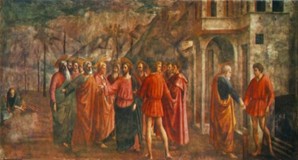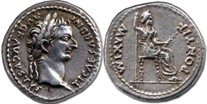This brief study of the coins mentioned in the Gospel has helped us to better understand Jesus’ teachings. Knowing the value of each one allows us greater objectivity in grasping the message the Lord conveys in those passages. For this reason, we have titled it “A Treasure to delve deeper.”
II Part – The Denarius
A Roman coin of 3.85 grams of silver, commonly used and equivalent to the daily wage of a worker or a soldier. In the time of Jesus, it held a value similar to the Greek drachma. It is the coin that best allows comparison between those of that era and modern ones.[1] It is the most frequently mentioned in the New Testament: eleven times.

Tribute to Caesar by Massaccio (1426-27)
Massaccio (1426-27)
Mentions in the Gospels:
Matthew, 18, 28: parable of the talents, the fellow servant owed one hundred denarii.
Matthew 20, 1-16: a landowner who hires workers for one denarius a day.
Matthew 22, 15-22. Mark 12, 15 and Luke 20, 20-25: they ask Jesus if it is lawful to pay tribute to Caesar.
Mark 6, 35-37 and John 6, 1-12: first multiplication of the loaves. “200 denarii worth of bread would not be enough…”
Mark 14, 3-9 y John 12,1-7: Anointing at Bethany. “The perfume could have been sold for three hundred denarii.”
Luke 7, 41-43: a money lender who had two debtors.
Luke 10, 30-37: parable of the Good Samaritan.

Denarius
As the Gospel itself states, a denarius was equivalent to the daily wage of a field worker. This value allows us to compare it to what might be a similar amount at today’s prices. We have calculated these figures based on the daily base salary in Spain in 2021 (32.17 euro) and 2024 (37.8 euro)
Therefore, the two hundred denarii of bread required to feed the multitude would today equal about 7,560 euro. An amount that lends significance to the numbers in the Gospel, which states that the Lord provided bread for more than 5,000 men.
The use of the denarius in the parable of the workers in the vineyard illustrates that the reward in the Kingdom of God is not based on the amount of work or time invested, but on the generosity and grace of God.
The perfume that the woman of Bethany breaks in honor of Jesus, according to the Gospel, could have been sold for three hundred denarii. Today, that would equate to approximately ten to eleven thousand euro. This is a very high price for perfume.

Flemish Master, “The Woman of Bethany,” 1510–1520, Budapest
The tribute to Caesar was established by Pompey in 63 B.C. when he subjected the country to Rome. Judea was subjected to various taxes: territorial, on goods, and personal. Among them were taxes on income and on each individual, called “tributum capitis,” which evidenced a person’s dependence on Rome. This is the tribute referenced in the Gospel passages. It was an annual amount of one denarius (today equivalent to 32.17 euro in Spain). It did not represent an excessive economic burden but did carry a moral weight due to submission to a gentile emperor, which was frowned upon by the more stringent Jews. The Sadducees—primarily a priestly class with Hellenistic tendencies and more accommodating to the political conditions created by Rome—accepted the lawfulness of the payment under certain aspects. They even offered a daily sacrifice in the Temple praying for the emperor’s health. Some of them were part of the Herodian party, supporters of Herod’s monarchy and allies of Rome. An opposing sect was that of the lay Pharisees, who considered themselves more faithful to tradition; among them were the “Zealots,” uncompromising and fanatical. They viewed the tax as illicit and sacrilegious. The two sects conspired to trap Jesus, knowing that his response could lead to denunciation by either the people or the Romans. Jesus’ response, filled with divine wisdom, teaches us the relationship and independence that should exist between the Church and the political community. We can summarize what the Church teaches on this point as: Each in its own sphere is mutually independent and autonomous. Nevertheless, both, though under different titles, are at the service of the personal and social vocation of the same people. They will exercise this service for the good of all more effectively the better they foster healthy collaboration between them (paraphrase of Vatican II, Constitution Gaudium et Spes, n.76).
The denarius is used in the Gospels to help teach profound lessons about God’s justice, grace and both civil and spiritual responsibilities.
By Josep M. Vilar Bassas and Maria Vilar Vinyeta (Experience Campus – UIC Barcelona).
[1] Josep Ma Vilar: “Les Monedes de l’Evangeli”, page 32.
